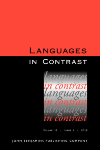
Languages in Contrast
Scope & Guideline
Charting New Territories in Language Studies
Introduction
Aims and Scopes
- Contrastive Linguistics:
The journal emphasizes systematic comparisons between languages, examining grammatical structures, lexical items, and syntactic constructions, which helps in understanding how different languages express similar concepts. - Translation Studies:
A significant focus is placed on the translation processes and strategies, particularly in how languages manage semantic equivalence, idiomatic expressions, and culturally embedded meanings. - Corpus Linguistics:
Utilizing corpus-based approaches, the journal analyzes large datasets of language in use, allowing for empirical studies that reveal patterns and trends across different languages and registers. - Cross-linguistic Phenomena:
The journal investigates cross-linguistic phenomena such as dependency length, motion events, and grammatical constructions, providing insights into cognitive and cultural factors influencing language use. - Multimodal and Embodied Language:
There is an exploration of how language interacts with non-verbal elements, particularly in signed languages, emphasizing the relationship between language and bodily enactment.
Trending and Emerging
- AI and Translation:
There is a growing interest in the intersection of artificial intelligence and translation studies, particularly in how AI-generated translations can be critically analyzed and compared with human translations. - Multimodal Approaches:
Recent publications reflect an increasing focus on multimodal communication, exploring how language interacts with visual and gestural elements, especially in signed languages. - Cognitive Linguistics:
Emerging studies are delving into cognitive aspects of language use, particularly how different languages conceptualize similar ideas, revealing the interplay between language and cognition. - Cross-linguistic Complexity:
The trend towards analyzing cross-linguistic complexity is gaining traction, with researchers exploring how various languages manage complexity in syntax and semantics. - Pragmatics and Contextual Meaning:
There is an expanding interest in pragmatics, especially regarding how contextual factors influence meaning across different languages, reflecting a shift towards understanding language in use.
Declining or Waning
- Historical Contrastive Studies:
There has been a noticeable decrease in papers focusing on historical comparisons of languages, suggesting a shift away from examining how languages have evolved over time in favor of more contemporary analyses. - General Language Description:
The journal has seen fewer submissions that focus on broad, general descriptions of languages, indicating a trend towards more specific, focused studies that address particular linguistic phenomena. - Philosophical Linguistics:
Research that engages deeply with philosophical questions surrounding language use and meaning has diminished, as the focus has shifted more towards empirical and data-driven studies.
Similar Journals

MACHINE TRANSLATION
Transforming language through technology.MACHINE TRANSLATION, published by Springer, is a premier academic journal dedicated to the interdisciplinary fields of Artificial Intelligence, Linguistics, and Software Development. With its origins dating back to 1989, the journal has played a crucial role in disseminating cutting-edge research and advancements in machine translation technologies. The journal holds a distinguished Q3 ranking in Artificial Intelligence and Q1 in Linguistics and Language for 2023, underlining its relevance and impact in the linguistic and computational research communities. Despite coverage discontinuation in Scopus, it continues to have impressive rank positions in various categories, including 31st percentile for Language and Linguistics and 112th for Artificial Intelligence. Researchers, professionals, and students can access a wealth of impactful articles that explore the latest methodologies, tools, and applications in the domain of machine translation, solidifying its importance for anyone vested in the future of language technology.
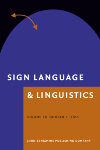
Sign Language & Linguistics
Fostering Scholarly Dialogue in Sign LinguisticsSign Language & Linguistics is an esteemed academic journal published by John Benjamins Publishing Co, dedicated to advancing the field of sign language studies and linguistics. With an ISSN of 1387-9316 and an E-ISSN of 1569-996X, this journal has earned a prominent place in the linguistic community, achieving a Q1 ranking in both the Linguistics and Language category, and standing out within the Scopus rankings, placing in the 77th percentile among the Arts and Humanities and 75th percentile in the Social Sciences categories. Sign Language & Linguistics spans over two decades of research, offering comprehensive insights and analyses from 1998 to 2024, promoting high-quality scholarly communication. Aimed at researchers, professionals, and students alike, this journal is essential for those exploring the intersection of sign languages, linguistics, and cultural studies, facilitating progressive discourse and fostering an understanding of this vital mode of human communication.
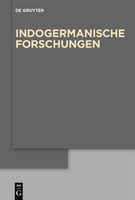
INDOGERMANISCHE FORSCHUNGEN
Illuminating the Path of Comparative LinguisticsINDOGERMANISCHE FORSCHUNGEN is a prominent academic journal, published by WALTER DE GRUYTER GMBH, focused on the field of linguistics and language studies. With an impressive history that dates back to 1892, this journal has been a vital resource for researchers and professionals exploring the intricacies of Indo-European languages. Although it does not offer open access, its comprehensive and rigorous articles—published in both print (ISSN: 0019-7262) and electronic formats (E-ISSN: 1613-0405)—are instrumental for anyone delving into historical linguistics and comparative studies. The journal currently holds a Q3 ranking in Linguistics and Language, indicating its significance within the academic community, as evidenced by its Scopus rankings in both the Arts and Humanities and Social Sciences domains. Spanning decades of scholarship, INDOGERMANISCHE FORSCHUNGEN plays a pivotal role in advancing the study of language and is essential for scholars aiming to contribute to the dialogue in this ever-evolving discipline.

SKASE Journal of Theoretical Linguistics
Bridging Heritage and Modernity in Linguistic ScholarshipSKASE Journal of Theoretical Linguistics, published by the SLOVAK ASSOCIATION STUDY ENGLISH-SKASE, is a distinguished Open Access journal that expands the horizons of linguistic research and theoretical frameworks. With its ISSN N/A and E-ISSN 1336-782X, the journal has established itself as a pivotal resource for scholars in the field, achieving a commendable Q2 ranking in Linguistics and Language as of 2023. The journal, which has been in continuous publication since 2017, actively publishes innovative research studies, reviews, and theoretical discussions, easing access to groundbreaking work for academics and practitioners alike. Based in Slovakia, it connects a rich heritage of linguistic scholarship and is indexed in Scopus, ranking alongside its peers in both Arts and Humanities and Social Sciences categories. The SKASE Journal of Theoretical Linguistics is crucial for anyone interested in the evolving landscapes of linguistics, serving as an invaluable platform for disseminating knowledge and fostering collaboration amongst researchers worldwide.
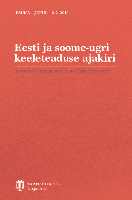
Eesti ja Soome-Ugri Keeleteaduse Ajakiri-Journal of Estonian and Finno-Ugric Linguistics
Championing Open Access to Linguistic DiscoveriesEesti ja Soome-Ugri Keeleteaduse Ajakiri - Journal of Estonian and Finno-Ugric Linguistics is a premier academic journal published by UNIV TARTU PRESS, dedicated to advancing the field of linguistics with a particular focus on the Estonian and Finno-Ugric languages. Since its inception, the journal has embraced an Open Access publishing model, allowing researchers and enthusiasts to freely explore its groundbreaking studies and findings since 2013. With an Impact Factor that places it in the Q3 quartile of leading journals within the linguistic domain, it serves as a vital platform for the dissemination of new research and theoretical advancements. Ranked 410th out of 1088 journals in the Arts and Humanities category for Language and Linguistics, it reflects a robust commitment to quality scholarship that appeals to academics, professionals, and students alike. Operating from Tartu, Estonia, the journal aims to foster greater understanding and appreciation of the Estonian language within the broader context of Finno-Ugric studies, making it an essential resource for anyone interested in these unique linguistic cultures.

GLOTTA-ZEITSCHRIFT FUR GRIECHISCHE UND LATEINISCHE SPRACHE
Exploring the Depths of Ancient LinguisticsGLOTTA-ZEITSCHRIFT FUR GRIECHISCHE UND LATEINISCHE SPRACHE, published by Vandenhoeck & Ruprecht GmbH & Co KG, stands as a pivotal academic journal within the field of Classics and Linguistics, demonstrating a strong commitment to advancing scholarly discourse surrounding the Greek and Latin languages. With a respectable Scopus ranking placing it in the top 77th percentile for Classics, this journal facilitates the dissemination of high-quality research and insights relevant to linguists, philologists, and historians alike. The journal operates without an open access model, ensuring its niche scholarship remains exclusive yet profoundly impactful. The HIndex is indicative of its longstanding influence, with the journal traces its roots back to its inception, with weighted contributions across several pivotal years. Furthermore, the journal's current standing—positioned in the Q2 quartile for Classics and Q3 quartile for Linguistics—reflects its thriving relevance and aspiration towards academic excellence, offering a significant platform for the exchange of ideas within the global scholarly community. Researchers, professionals, and students are encouraged to engage with the journal's contributions, as it consistently reflects the evolving dialogue in the study of ancient languages.

Suvremena Lingvistika
Exploring the Boundaries of Language and Thought.Suvremena Lingvistika is a distinguished open-access journal published by the Croatian Philological Society, dedicated to advancing research in the field of linguistics and language. Since its establishment, the journal has been pivotal in promoting scholarly dialogue within the linguistics community, especially among researchers and academics in Croatia and beyond. With an ISSN of 0586-0296 and an E-ISSN of 1847-117X, the journal has transitioned to an open-access model since 2007, ensuring that research is freely accessible to all. As of 2023, it holds a respectable Q3 ranking in the Linguistics and Language category, reflecting its potential contribution to the field. The journal's scope encompasses a wide array of linguistic disciplines, encouraging both theoretical and empirical studies. Supportive of new research, Suvremena Lingvistika aims to foster innovative approaches and methodologies in linguistics, making it an essential resource for students, researchers, and professionals eager to explore the complexities of language. With its ongoing publication until 2024, it continues to shape the linguistic landscape, providing valuable insights and fostering collaboration among scholars globally.
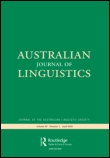
Australian Journal of Linguistics
Fostering Insightful Discourse in LinguisticsThe Australian Journal of Linguistics, published by Routledge Journals, Taylor & Francis Ltd, stands as a distinguished platform in the field of linguistics, fostering rigorous academic discourse since its inception in 1981. With an ISSN of 0726-8602 and an E-ISSN of 1469-2996, the journal has achieved a notable Q2 ranking in the linguistics and language category for 2023, indicating its quality and relevance within the academic community. With a Scopus ranking of #316 in Arts & Humanities and #373 in Social Sciences, it sits in the 71st and 68th percentiles respectively, underscoring its impact in the fields it encompasses. The journal aims to publish high-quality research articles that contribute to the understanding of linguistic theory, sociolinguistics, and applied linguistics, making it an essential resource for researchers, professionals, and students alike. The journal is based in the United Kingdom, at 2-4 Park Square, Milton Park, Abingdon OX14 4RN, Oxon, England, and actively encourages contributions that can expand the current linguistic discourse, reinforcing its commitment to highlighting diverse perspectives in language research.

Journal of Comparative Germanic Linguistics
Advancing Comparative Insights in Language EvolutionThe Journal of Comparative Germanic Linguistics, published by SPRINGER, is a leading peer-reviewed academic journal that has significantly contributed to the fields of linguistics and arts and humanities since its inception. With an impressive impact factor and consistently ranked in the Q1 category in both Arts and Humanities (miscellaneous) and Linguistics and Language, this journal serves as a vital platform for scholars to disseminate their research on comparative studies in Germanic languages. The journal's scope encompasses a broad range of topics, fostering an interdisciplinary dialogue that enhances our understanding of language development, structure, and evolution. Although currently not an open-access journal, the Journal of Comparative Germanic Linguistics ensures that its high-quality articles reach a global audience, appealing to researchers, professionals, and students who are keen to explore the nuances of Germanic linguistics. With its strategic address in the Netherlands, the journal stands at the forefront of linguistic research, providing valuable insights that contribute to the academic community's knowledge base.
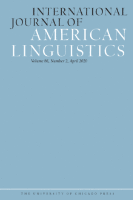
INTERNATIONAL JOURNAL OF AMERICAN LINGUISTICS
Pioneering Research in the Dynamics of Language.The INTERNATIONAL JOURNAL OF AMERICAN LINGUISTICS, published by University of Chicago Press, is a revered scholarly publication dedicated to the exploration and advancement of linguistic studies, particularly those related to the American linguistic landscape. With an ISSN of 0020-7071 and an E-ISSN of 1545-7001, this journal serves as a vital platform for researchers, professionals, and students interested in the nuances of language, dialects, and linguistic structures through rigorous academic inquiry. The journal has established a commendable impact, reflected in its ranking within the Q2 category in Linguistics and Language and its placements in the Scopus rankings, thereby positioning itself within the 50th to 53rd percentile of its respective fields. While the journal does not provide Open Access options, it continues to be a cornerstone resource for those seeking to expand their understanding of American linguistics, already converging from 1996 to 2024. Through its continued commitment to excellence, this publication remains essential for those aiming to contribute significantly to the field.